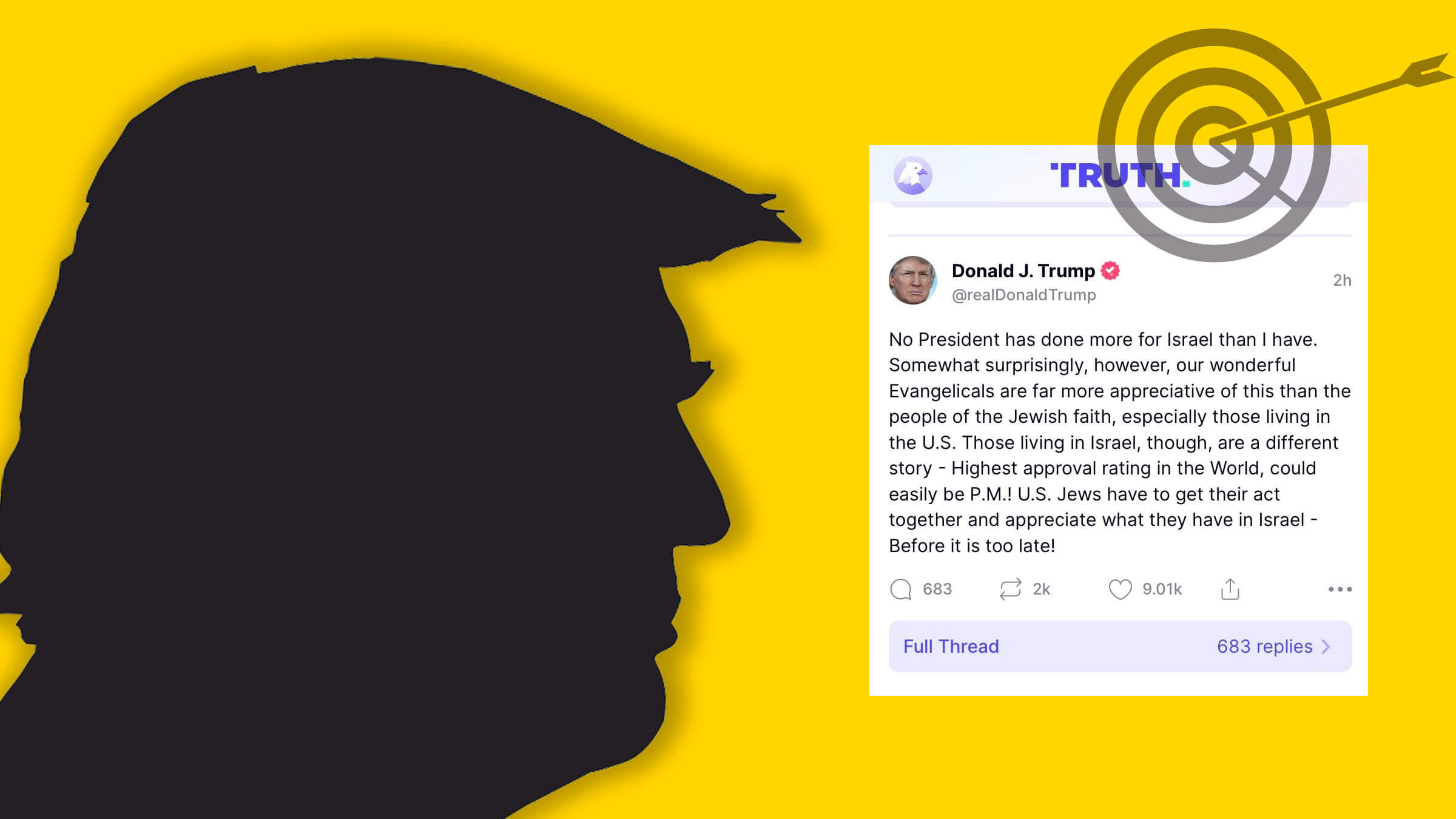Why is Donald Trump harassing Jews?
Posting that Jews need to ‘get their act together’ paints a target on our backs

Graphic by Angelie Zaslavsky
In two separate recent incidents, audience members have tried to shout down Jewish comedians mid-act.
In Omaha, a heckler yelled “Free Palestine!” during stand-up comedian Sam Morril’s set.
And in Point Pleasant Beach, New Jersey, comedian Ariel Elias faced a pro-Trump heckler who demanded to know who she voted for.
And then this morning, former President Donald Trump heckled all American Jews.
Jews in the United States must “get their act together,” Trump wrote on his Truth Social platform, “before it’s too late!” He wrote that Evangelical Christians are “far more appreciative” of Israel and what Trump “has done for Israel” than “people of the Jewish faith.”
There are two problems with what Trump posted. One, it’s false. And two, it poses a threat to Jewish lives.
American Jews are overwhelmingly supportive of Israel. Eight in 10 American Jews say Israel is an essential or important part of what being Jewish means to them, according to a 2020 Pew Research Center survey. Just under half of American Jews have visited Israel, too. American Jews may oppose specific Israeli government policies, but only 15% say Israel is not important to their Jewish identity.
In his post, Trump wrote, “no president has done more for Israel” than he has. While the Trump administration recognized Jerusalem as Israel’s capital and brokered the Abraham Accords among Israel and several Arab countries (with which it already had economic and other ties), historians have pointed out that other presidents have done more: President Harry Truman first recognized the Jewish state. President Jimmy Carter brokered a lasting peace between Israel and Egypt, at the time Israel’s biggest enemy. And President Barack Obama gave more money and arms to Israel than any president ever had.
Trump’s post ignored these facts and instead singled out American Jews as ingrates. He added a veiled threat, too, proclaiming that American Jews need to change “before it’s too late!”
Trump’s Jewish supporters tend to either agree with his messages or dismiss them as a harmless example of Trump being Trump — the guy in the back of the comedy club with the loudest mouth.
“I can just tell by your jokes you voted for Biden,” the heckler in New Jersey shouted at Elias. She wryly responded, “I can tell by the fact that you’re still talking when nobody wants you to that you voted for Trump.”
When a former president with millions of followers heckles American Jews, it’s not even remotely funny. A 2020 study of online antisemitism found that instances of hate spiked after the 2016 presidential election, when the Trump campaign pushed similar slurs against American Jewish loyalties, and after the “Unite the Right” march in Charlottesville.
“We find the frequency of antisemitic content greatly increases (in some cases more than doubling) after major political events,” the researchers wrote.
In other words, Trump speaks, the memes follow, and antisemitic acts increase.
Whether Trump himself is antisemitic or not is beside the point. One thing we know about antisemitism is it increases during times of economic downtown and political uncertainty, which pretty much sums up the last few years.
“When the society suffers, it needs someone to blame, someone upon whom to avenge itself for its disappointments; and those persons whom opinion already disfavors are naturally singled out for this role,” write the authors of a 2020 study on conspiracy theories and Jew-hatred.
By singling out American Jews because they don’t support him or a particular Israeli government, Trump painted a crude target on our backs.
“Culpability is a tricky thing,” wrote the journalist Julia Ioffe following the 2018 antisemitic massacre at Pittsburgh’s Tree of Life synagogue, “and politicians, especially of the demagogic variety, know this very well. Unless they go as far as organized, documented, state-implemented slaughter, they don’t give specific directions. They don’t have to. They simply set the tone.”
The tone is increasingly nasty — just check out the hecklers attacking Jewish comics. If only they would all just sit down and be quiet.





















